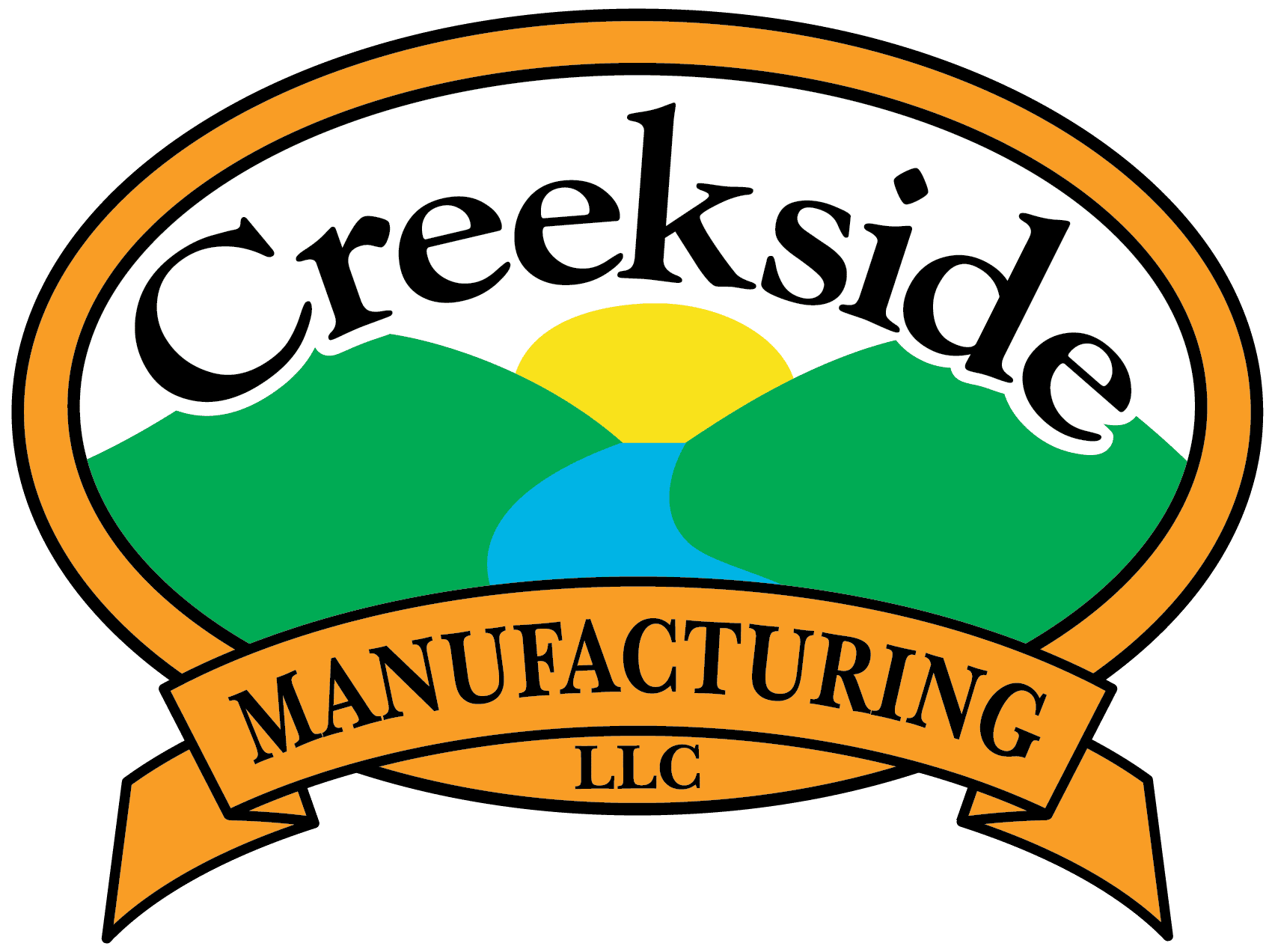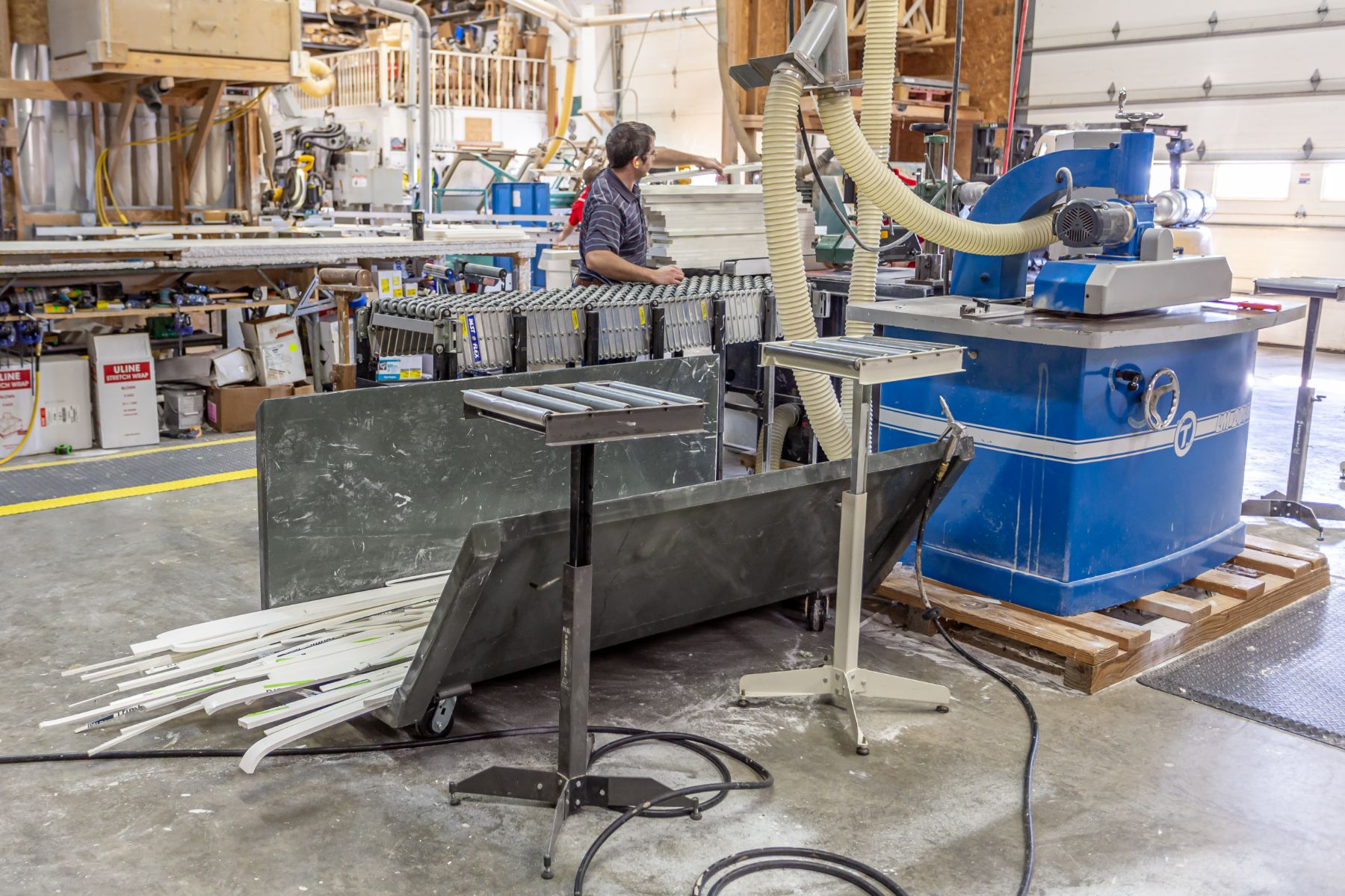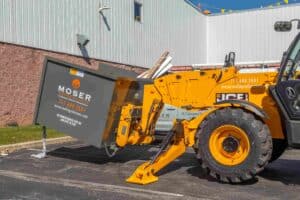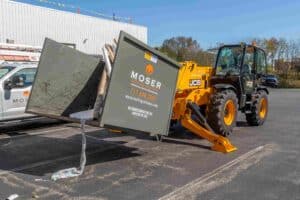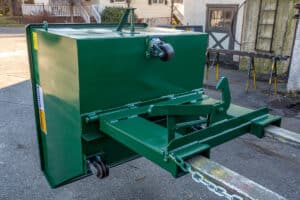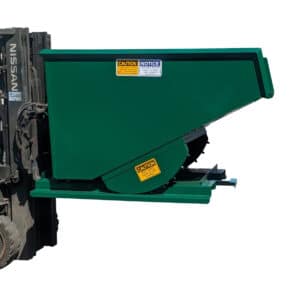Self-dumping hoppers are quietly transforming how industrial businesses in Pennsylvania handle their waste, and if you’ve worked in a shop or job site without one, you’ll feel the difference immediately. These rugged steel dumpsters make it easier, safer, and faster to move everything from sawdust and scrap metal to construction debris and rejected materials.
At Creekside Manufacturing, we’ve seen firsthand how companies across Pennsylvania are ditching their clunky trash bins and upgrading to hoppers that work smarter. In this post, we’ll break down the top five industries using self-dumping hoppers in PA, explain why they’re such a game-changer, and share advice for anyone thinking about buying a hopper online.
If you’re ready to explore your options now, you can check out our Pennsylvania dump hoppers or contact us directly to get a quote.
What Is a Self-Dumping Hopper (And Why Do Businesses Love Them?)
A self-dumping hopper is a steel container designed to attach to a forklift, collect waste or scrap where it’s generated, and then automatically tip forward to dump its contents into a dumpster or roll-off container. Operators pull a lever (or trigger a pull-rope or bump-and-dump system), and gravity does the rest.
Why do people love them? Because they eliminate the need for risky manual dumping AND manual labor. They’re fast, they’re easy to use, and they make lean workflows and OSHA compliance a whole lot more attainable. Plus, you can get them with all kinds of features: fluid reclaim systems for metal shops, lids for food waste, and custom dump hoppers and sizes to fit tight spaces.
The Industries Using Self-Dumping Hoppers in PA
1. Woodworking Shops, Sawmills & Pallet Plants
Anywhere there’s a pile of sawdust or a stack of wood offcuts, there’s usually a hopper nearby. Wood shops and sawmills use our dump hoppers (often the Hefty Hopper) to transport material to grinders or outdoor roll-off dumpsters quickly. It keeps the floors clean and helps reduce fire hazards, which is no small thing in high-dust environments.
2. Metal Fabrication Shops & Recycling Centers
Hoppers are a must in metalworking environments, especially when you’re dealing with sharp edges and heavy cutoffs.
Many fabrication shops also reclaim fluids like coolant from their machines using a hopper outfitted with a fluid reclaim system. These setups let you separate fluids from scrap and cycle them back into the process, reducing waste and saving money.
3. Construction Sites & Contractors
From framing to roofing, construction crews generate waste constantly. The smartest job sites position multiple construction hoppers around the site so debris can be dropped right where it’s produced. Once full, the hopper is easily moved by forklift and dumped into a roll-off container, with no hauling trash cans, no heavy lifting, and no messy job site hazards.
4. Building Product Manufacturers
When you’re fabricating anything—from drywall panels to custom trusses—offcuts and production waste add up fast.
Building product manufacturers rely on Creekside’s convenient self-dumping hoppers to keep workstations clean and avoid slowdowns. The ability to move waste out without disrupting production is one of the reasons these facilities are buying more hoppers every year.
5. General Industry & Everyday Bulk Material Handling
We’ve sold hoppers to farms, warehouses, distribution centers—you name it. If you have trash, scrap, or heavy materials to move and you’re using a forklift, a dump hopper is one of the easiest upgrades you can make. It’s especially helpful for teams that are tired of tipping over barrels and chasing trash cans across the lot on windy days.
Why Are Dump Hoppers So Valuable for These Industries?
For starters, they’re safer. Many companies originally switched to hoppers to reduce injury risk and avoid OSHA violations, especially those involving forklifts lifting trash cans or workers climbing on pallets to dump barrels into roll-offs.
They’re also just more efficient. Operators can stay in the seat, drive to the dump location, release the load, and get back to work. No stopping to tie off harnesses, no wrestling with overstuffed bins, and no cleanup if a trash can tips over.
Hoppers also support lean manufacturing by allowing waste to be collected exactly where it’s generated. That kind of flow saves time, reduces double handling, and keeps your team focused on what really matters.
How Safety Standards and OSHA Drive Hopper Demand
One of the biggest reasons hopper use is increasing in Pennsylvania is safety. Companies are under pressure to meet OSHA standards, and many are investing in equipment that keeps workers on the ground and away from unsafe lifting practices.
Features like our bump-and-dump and pull-rope systems allow forklifts to dump hoppers without the operator ever leaving the seat. Larger companies with safety officers on staff are especially drawn to these options.
With more businesses focusing on reducing worker’s comp claims and avoiding fines, safety-compliant dump hoppers are quickly becoming standard equipment.
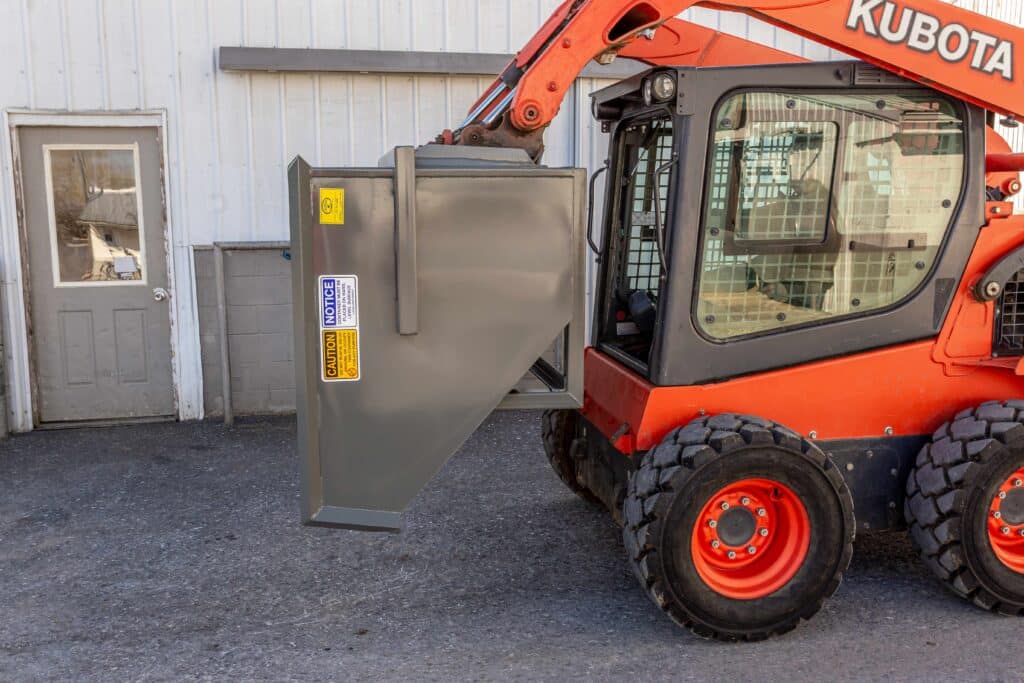
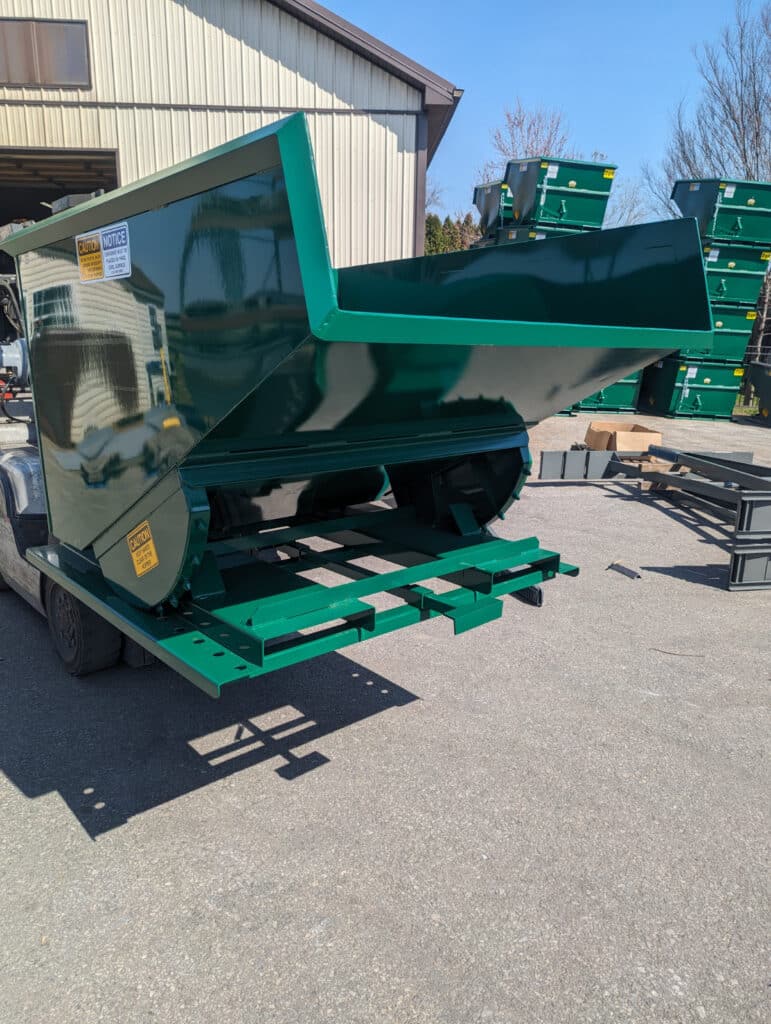
Not All Dump Hoppers Are Built the Same
One of the first things we recommend to new buyers is to compare empty weight and load ratings. These specs tell you a lot about the build quality. Our standard dump hopper models are rated to handle 4,000 lbs, and our heavy-duty hoppers are rated for 6,000 lbs. Compare that to some of the ultra-light imported models on the market, and you’ll see why ours are built to last.
We’ve also standardized many of our most popular features, like fluid drains, remote dumping systems, and extra-wide builds based on what our customers have asked for over the years. That helps us deliver semi-custom functionality at a more affordable price.
If you need something totally custom (like a unit that fits between machinery or has a special footprint), we can do that too, and low-profile dump hoppers are a common build here at Creekside.
Common Mistakes When Buying Self-Dumping Hoppers
A few mistakes we see over and over again:
- Choosing used hoppers without checking condition or safety. Some are bent or damaged from impacts, and many no longer roll or dump properly.
- Overpaying for imports that don’t function as true self-dumping hoppers. Some units labeled “self-dumping” require a manual push to actually tip over—not ideal.
- Ignoring build specs. Just because a hopper looks heavy-duty doesn’t mean it is. Look at the empty weight, welds, and rated capacity.
And finally, some buyers assume new is too expensive, but end up paying nearly the same for used models that won’t last. At Creekside, we make sure you’re getting real value, backed by a 100% satisfaction guarantee.
“One of the surest ways to check how well a hopper is built is to compare the empty weight. Some of those imported ones are so light, they barely dump on their own.”
The Industry Is Growing, and So Are We
Demand for self-dumping hoppers in Pennsylvania is rising year after year. Businesses are scaling, job sites are getting smarter, and more people are buying hoppers online to save time and money. At Creekside, we’ve ramped up production, improved our dumping design, and continue to support companies across a wide range of industries.
While we specialize in our own builds, we’re also honest about when another solution might fit better—and we’re not afraid to recommend a competitor if it serves the customer better. That’s how confident we are in the quality and versatility of what we offer.
Is It Time to Ditch the Trash Cans? Give Us a Call
If you’re in woodworking, metal fabrication, construction, or manufacturing—and especially if you’re in Pennsylvania—it might be time to upgrade. A self-dumping hopper could be one of the smartest investments you make this year. If you’re shopping for a dump hopper near you for the first time, here are a few tips:
- Check the empty weight—heavier usually means stronger steel.
- Look for a rated capacity of 4,000 lbs or more for standard use.
- Ask about warranties or satisfaction guarantees.
- Avoid imports that cut corners on materials or safety design.
- Buy from a trusted local manufacturer—like Creekside—who can walk you through what will work best.
Whether you’re trying to buy a dump hopper online or outfitting a fleet, Creekside is here to help you get the right equipment for your workflow.
Want to talk through your options? Contact Creekside today to get expert advice, fast shipping, and hoppers built to handle the work you do.
